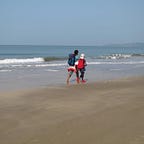Confession
--
It was a Wednesday morning, early in the month of March, and the sun had just begun to emerge around the corner, feeling its way up the canteen steps. Classes would begin in half an hour but for now, time was mine. Still tucked away in the faint blue shadows, I began to read. The first bell rang and I read right through it. The second bell rang and I paused to watch long legs hurry criss-cross, criss-cross just above the pages of my book like the flashing black and white of highway dividers past the window of a speeding car. The third bell rang and the thought of my attendance hovered briefly, like a fretful bee, beside my deaf ears before giving up and sinking down defeated, onto my shoulder.
“Who are you?
And where does the world come from?”
I never took philosophy seriously. It seemed pointless. An activity for all the cynics and pessimists of the world to engage in, as they sat around in town squares with nothing better to do. “What is the point of living?” they all moaned in hopeless unison and it disturbed me that philosophy never gave any answers. In fact, it didn’t even attempt to.
In college, the challenge is not academic. It is not the kind that drives you home early and spurs you into hours of research where you chew on arguments and struggle to better your understanding. But not having to think scares me. It makes my eyes feel empty. So I seek solace in theory and my reading turns away from magical realism to history, economics and especially philosophy. Those subjects now feel solid. Like thick, heavy, self-confident books, holding their own on bookshelves. I read about Chaos theory and Postmodernism and for a minute my feet touch the bottom. Just the tip of my toes, alighting and then floating up again against my will. As though I am in a swimming pool, struggling to stay on the cold, tile floor.
I do not want to float.
“Are all horses the same?
And are we all born with innate ‘ideas’?”
The stereotype defines homeschoolers as highly academic, socially awkward beings who prefer the company of books to people and would rather solve a Rubik’s cube than be outdoors playing football. For the longest time, I battled this stereotype. I fought against the side of me that thrives on thought and denied adamantly, in the company of friends, my love for the crisp complexity of Virginia Woolf’s sentences.
John Lennon once said that “Life is what happens to you when you’re busy making other plans”. That Wednesday morning, early in the month of March, I felt so overwhelmed by Other Plans that if I had not sat on those blue, shadowed steps and read, I would have caved in. My friend says she doesn’t have the energy to read after a long day because her brain just does not want to work anymore. It would rather numb itself watching TV serials, an effortless and therefore relaxing activity. My mind buzzes when I fill it with TV serials. It buzzes like a room full of students who’ve stopped paying attention.
When I was homeschooled, people would look at all my craft projects and elaborate history timelines pasted up on the wall and go — oooh woww, you’re so talented! It wasn’t talent. We homeschoolers just have the time. The time that schools steal away from you, that constant company denies you, that TV serials buzz into oblivion. The time I seem to no longer have.
“Is there such a thing as natural modesty?
And why is Lego the most ingenious toy in the world?”
The idea of living alone had always been for me, unthinkable. Coming back after a long day to an empty house? Having dinner in silence, alone? With no one to discuss your day with, no one to fight with, no one to carelessly waste time with? Depression would lurk there, I was sure of it. But now… I wonder.
Because people are nice in small portions. They’re nice to share food with, nice to listen to and laugh with, nice to hug. But I cannot think when they are around and an overdose of their company makes me restless. I love you, but may I return to my book now please?
It is ironic that I should think such thoughts now, at a time when I have finally found people I want to be with. It is easier to choose a book for company when you have not yet met people who give it serious competition.
Today, the classmates who come plonk themselves down beside me on the canteen steps, munching away on their samosas and making faces as they judge the world, fight a frighteningly matched battle against my books. They do not make it easy to want solitude.
“Do you believe in Fate?
And is sickness the punishment of the Gods?”
It’s 6:30 a.m. and the roads are covered in a soft fuzz that tastes like the air you breathe onto your tongue after eating toothpaste. The sunlight smells like paper-thin curls of wood shavings and dusty bamboo. It is always cold in Cubbon Park. I put away my earphones, taking time to wind them up in neat loops. Khalid Hussein once said that God can only be found in hospitals. When people have no one else to turn to, they call upon him. But what if you have never believed before? How do you begin, whom do you call?
At whose feet do you lay your disquiet down to rest?
“Poetry is confession” reads Etienne sir as we study Czeslaw Milosz.
And prose is too.
